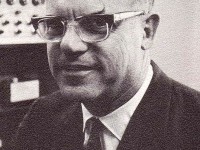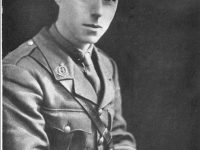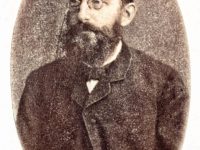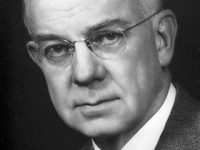
René Jules Dubos (1901-1982)
On February 20, 1901, French-born American microbiologist, experimental pathologist, environmentalist, humanist, and winner of the Pulitzer Prize René Jules Dubos was born. Dubos is credited for having made famous Jacques Ellul‘s environmental maxim, “Think globally, act locally” (penser global, agir local). In Research, he is best known for his pioneer work in isolating antibacterial substances from certain soil microorganisms and the discovery of major antibiotic.
Becoming a Microbiologist
Dubos was born in Saint-Brice-sous-Forêt, France, and grew up in Hénonville, another small Île-de-France farming village north of Paris. At World War I (WWI), Rene’s father bought a butcher shop in Paris, but was almost immediately called into the military service. His mother and René ran the butcher shop during the war. He completed his high school training at College Chaptal in 1919. At this time his father died of a wound received in the war.[2] In 1921 Dubos graduated from the Institut National Agronomique in Paris. An article by a Russian microbiologist, Sergei Winogradsky changed his life, in which he claimed that soil bacteria should be studied in their own environment, not merely in laboratory cultures. After reading this article Dubos decided to become a microbiologist.[2]
Emigration to the USA
Three years later he emigrated to the United States and continued his studies at Rutgers University, where he graduated Ph.D. in 1927 with his research on the way different organisms in the soil decompose cellulose. This research revealed to him the wide range of microbiological activity that existed in natural environments. Dubos began his career in microbiology in 1927, when he joined Oswald Avery‘s laboratory at The Rockefeller Institute for Medical Research, which in 1965 became Rockefeller University.[5] During this period, Dubos moved up the scientific ladder from assistant, in 1928 to professor in 1956.
The Discovery of Antibiotics
Oswald Avery was looking for a microbe that could break down the polysaccharide capsule of a deadly strain of bacterial pneumonia in the same way that soil bacteria digested decaying organic matter in the woods. Dubos identified a bacterium that secreted an enzyme that broke down polysaccharide. In 1939, with the help of Rockefeller Institute biochemist Rollin Hotchkiss, Dubos isolated the antibacterial agents tyrothricin and gramicidin from the bacterium Bacillus brevis that killed or inhibited Gram-positive bacteria and tested their bacterial, chemical, and clinical properties. These antibiotics remain in limited use today. Other microbiologists were stirred by Alexander Fleming‘s discovery of penicillin and Dubos’s discovery of tyrothricin to make still other discoveries of broad spectrum antibiotics.[2,6]
Bacterial Resistance
In 1942, before antibiotics were in general use, Dubos already warned that bacterial resistance should be expected. At this time, laboratories were greatly handicapped by their inability to culture pathogenic bacteria, such as the tubercle bacillus, so that they would remain pathogenic. These organisms became harmless and almost worthless for disease research. By 1947 Dubos discovered how to grow pathogenic tubercle bacilli in large quantities.[2] In 1948, Dubos shared the Albert Lasker Basic Medical Research Award with Selman Waksman for “their achievement in studies of the antibiotic properties of soil bacteria”.
Humans must intervene to improve Nature
Dubos’s works include Bacterial and Mycotic Infections in Man (1948), Pasteur and Modern Medicine (1960), Man, Medicine, and Environment (1968), and So Human an Animal (1968). For his book So Human an Animal he received the Pulitzer Prize for General Non-Fiction in 1969. He wrote popular science books, for example on tuberculosis, environmental issues and Louis Pasteur. He was for many years an editor of the Journal of Experimental Medicine.[1] By the time Dubos retired from Rockefeller University in 1971 he was giving some forty public lectures each year. He is one of those to whom the slogan Think global, act local is attributed (as a consultant at the United Nations Conference for the Human Environment 1972), which was also a central idea of his books on environmental issues. In the last decade of his life, before his death from pancreatic cancer in 1982, Dubos asserted that the simple survival or sustainability of humanity is not enough. Humans must intervene to improve on nature, to humanize Earth.[4]
Think Global, Act Local | Lopa Banerjee | TEDxCardiffUniversity, [10]
References and Further Reading:
- [1] René Dubos – America microbiologist, at Britannica Online
- [2] King-Thom Chung, René Jules Dubos, 1901-1982), Bacterial Antibiotics, Environmental Microbiology
- [3] Paul L. Montgomery, René Dubos, Scientist and Writer, Dead, The New York Times, February 21, 1982.
- [4] “Dubos, René Jules.” Complete Dictionary of Scientific Biography. . Encyclopedia.com. 20 Feb. 2017
- [5] The Avery-McLeod-McCarthy Experiment, SciHi Blog, February 1, 2018.
- [6] Alexander Fleming and the Penicillin, SciHi Blog, September 4, 2012.
- [7] René Dubos at Wikidata
- [8] René Dubos at Reasonator
- [9] René Dubos, Of Human Nature (1968)
- [10] Think Global, Act Local | Lopa Banerjee | TEDxCardiffUniversity, TEDx Talks @ youtube
- [11] Timeline of American Microbiologists, via DBpedia and Wikidata






Pingback: HSH112 Foundation | Pearltrees